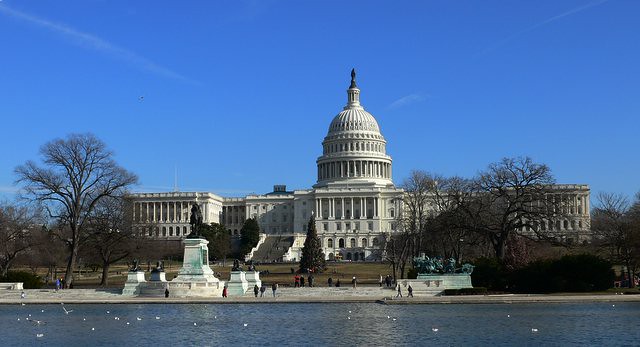The challenge with large governments (such as the USA’s) is that they produce huge packages of legislature that only few individuals can understand in its entirety. Thus, everybody focuses on what they are interested or specialized in, and there is the potential to slip things in that legislators aren’t aware of or don’t understand the ramifications of. This is especially true in the bills that have to be passed under time pressure, as has arguably happened with the so-called “Monsanto Rider”.

Image by Aleksey Masimov, via Flickr CC.
Section 735 was attached to the US’ Senate Continuing Resolution spending bill, which funds the government through November and had to be passed by March 27th to keep the government operational because they couldn’t agree on a real budget.
The rider is called “farmer assurance provision” and strips the rights of federal courts to stop the sale and planting of genetically engineered (GE) crops during the appeals process if a judge orders an environmental impact assessment done by the USDA.
The way I understand it, up to now, if there have been serious concerns about the health or environmental consequences of planting a certain GE crop, or if a judge deemed the environmental studies done up to that point as insufficient, the courts could order a planting stop until all concerns had been addressed; it seems to have worked according to a ‘precautionary approach’ of “better safe than sorry”.
With the new rider, the USDA would essentially be forced to approve temporary permits of biotech firms to continue selling, cultivating and planting the seeds in question while the review is conducted.
According to this news source, “It essentially eliminates the only legal tool environmental advocates have for slowing down or stopping the use of new genetically modified crops. It opens the door to the entry of a raft of GMOs awaiting approval, including Frankenfish, the first genetically engineered animal.“
From my understanding, these measures only apply to the interim phase until a final call on the approval or denial of a particular crop, but still – first, knowing the US (or any, for that matter) court system, that could take a while, and second, it just seems wrong from an ethical perspective to say “oh you can continue using these crops and selling them although they might be harming your health/the environment/etc., but we will tell you for sure later.”
On the other side, while environmentalist groups are calling it the “‘Monsanto Protection Act” and claiming that the rider is “preemptively deciding that industry can set its own conditions to continue to sell biotech seeds, even if a court may find them to have been wrongfully approved“, I feel like I can also get the point that farmers that have relied on these seeds for their current harvest can be seriously jeopardized in their livelihoods if a court rules that they cannot plant or sell these crops from one day to the other, especially if it might be a false alarm.
Yet, these cases don’t pop up out of the blue, but are considered with due diligence by courts in the first place, including considering the impacts on farmers, and thus I do feel like the legal avenues should be sufficient already.
Clearly, this is a complicated issue, and just hearing about the outlines gives me a ton to think about and consider. Rather than arguing for or against the existence of this law, I just wish it had gotten the legislative attention it deserved. According to the Center for Food Safety, “the committee held no hearings on this controversial biotech rider and many Democrats were unaware of its presence in the larger bill.”
This should just not be the case, ever. Sneaking legislation into adoption by relying on legislators to be too overwhelmed and under time pressure to notice it goes against any ideals of the democratic process, period. This is why the group Food Democracy Now is calling on US citizens to petition President Obama to veto the passage of Section 735. If you feel like doing that, you can access their website here.
What do you think? Is this another case of big agribusiness using their lobbying power to win out over democratic rights, or a legitimate protection of farmers’ livelihoods?
I don’t really understand this either. Thank you for drawing attention to it.